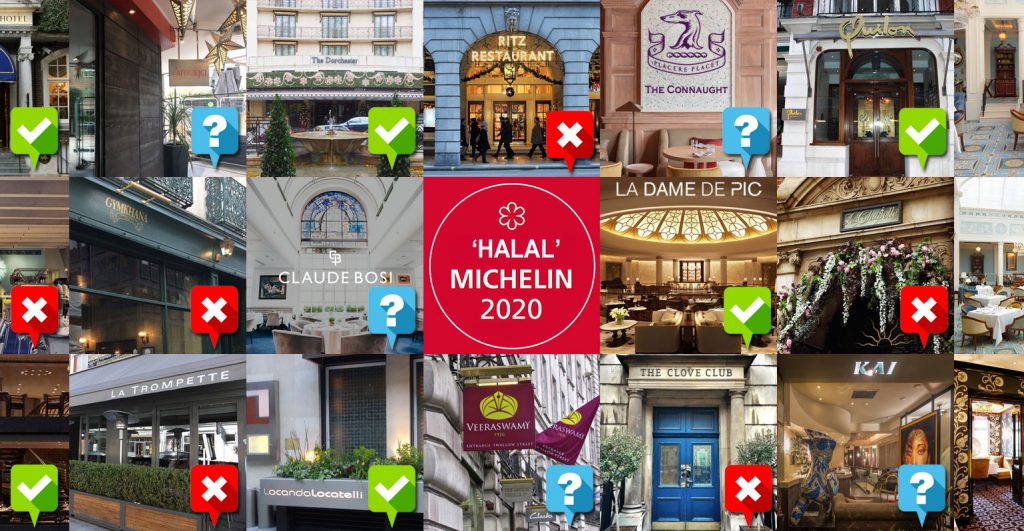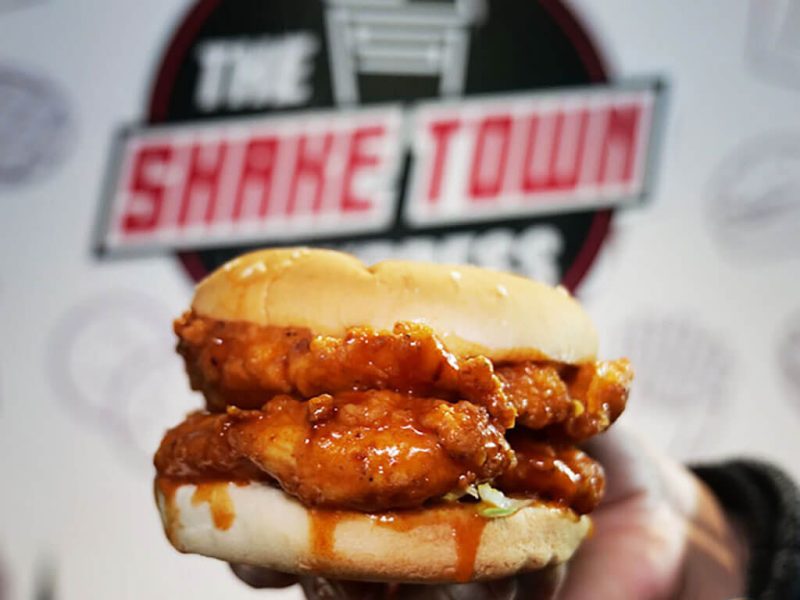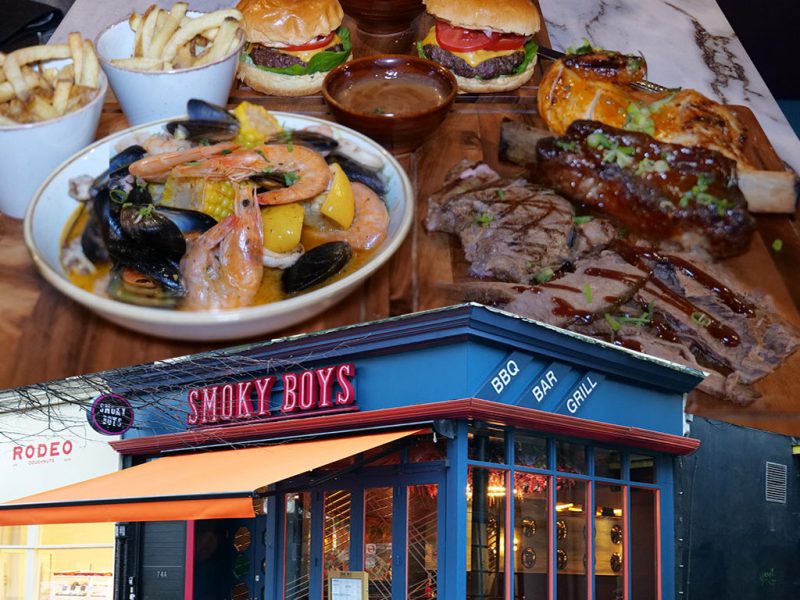Cross-contamination at London’s ‘Halal’ Michelin restaurants

Why do some Halal food bloggers and influencers continue to ignore cross-contamination as a condition in designating food and restaurants as Halal?
A report published by IlmFeed last year sought to question the criteria used by UK Halal food bloggers and influencers in determining the Halal status of restaurants.
What made this question such an important one was that it opened up a debate which, until then, hadn’t received the attention it demanded.
In the end, what the author discovered was a failure on the part of some in factoring in the crucial condition of cross-contamination when declaring things Halal.
Essentially, this issue seeks to determine whether restaurants, who cater for both Halal and non-Halal, have put into place policies and practices ensuring that the storage, preparation and cooking of both are done in such a way as to avoid cross-contamination.
Since then, while food bloggers and influencers seem to have improved in this regard, there are others – and important ones at that with tens of thousands of social followers – who are either ignorant of this condition or have chosen to ignore it.
As an influencer though, if you know your audience, then the excuse of ignorance simply cannot be so easily made, since it ought to be obvious to anyone with basic knowledge of the subject of Halal just how important this issue is to Muslims in general.
The fact that cross-contamination is significant enough to warrant a debate should be a good reason for bloggers and influencers to address this matter directly, at least for the sake of their followers.
Knowing just how sensitive Halal food being handled in the same environment as non-Halal is to so many, we approach this subject with a great deal of care and attention, such that, while this happens to be an integral part of our own criteria in determining an establishment’s Halal status, we believe it is equally important to bring this vital information to public attention and allow them to reach their own informed decisions.
Sadly, there are some who, while having chosen to put themselves in this position of influence, appear not to carry this same weight of duty or responsibility.
Can these Michelin restaurants ensure no cross-contamination?
YES!
Alain Ducasse at The Dorchester (Park Lane) ***
“The restaurant is fully compliant with Halal guidelines. Halal beef is sourced from a reputable and approved supplier. It is delivered in sealed packaging to prevent any risk of cross-contamination and is labelled to ensure full identification and traceability. The meat is stored in sealed packaging so that there is no risk of contact with non-Halal products. Dedicated Halal preparation boards and knives are used at all times.”
Celeste (Hyde Park Corner) *
“All our products in our main kitchen (different kitchen from Celeste restaurant) are Halal, therefore there is no worry of cross-contamination. In our Celeste kitchen, at the moment we do not have any Halal offering. This is because we have approached game season (which we have in our menu). When Celeste does offer Halal options, then there is no cross-contamination. All our non-Halal products are stored separate from the Halal ones.”
Hide (Piccadilly) *
“The meat offered is Halal certified. At Hide we are lucky to have numerous segregated kitchens and many chefs. The Halal food is stored in a separate refrigeration and cooked in a separate kitchen by a chef whose sole responsibility is to look after that table. Hands are washed prior (as is standard practice anyway) and separate utensils are used (again washed prior to use).”
La Dame de Pic (Tower Hill) **
“Having discussed with our team, I can confirm that we have designated storage and prep areas for Halal meat and it would not go into contact with anything else. The places in which the meat is prepared and the utensils used are thoroughly cleaned. However, we do not have a separate Halal kitchen.
“Should a guest request Halal food within one of our restaurants, we can, of course, also order Halal meals from an external caterer which can be brought into any of our restaurants; but would not be prepared by our teams.”
Locanda Locatelli (Marble Arch) *
Head Chef Sergio Fonkana has confirmed with us that not only is the Halal meat stored separately, but that the section it is prepared in and the utensils used are always cleaned with soap before being sanitised. The food is cooked separately. And Chef Sergio has assured that there’s no risk of cross-contamination.
Quilon (St James Park) *
Quilon has been personally reviewed by us, where we were granted exclusive access to their kitchen to see their Halal food being prepped and cooked for ourselves. Excluding game meat, which is prepped and cooked separately, their remaining food menu is Halal.
The Goring Dining Room (Victoria) *
Chef Graham Squire has verified with us that they can provide certificates of the Halal suppliers. The meats are stored separately. They also have a “separate prep area at the back”, with the area and utensils cleaned. The Halal chicken and lamb are cooked in a separate oven too.
Trishna (Marylebone) *
They have confirmed with us that only the chicken, lamb and goat are Halal, and are prepped and cooked separately, with no pork being part of the menu.
NO!
Galvin La Chapelle (Shoreditch) *
“We don’t claim to cater for Halal, and we do not offer Halal meat as part of our regular menus. Some of our guests request us to buy Halal meat for them and are made fully aware that it will be prepared and served within our kitchens. On the advice of our health and safety food auditors we have in place a disclaimer form which the diner signs in advance.”
Gymkhana (Green Park) *
Gymkhana has informed us that only the chicken, lamb and goat are Halal. And while all such dishes are prepped separately, applicable dishes are, however, cooked in the same tandoor oven.
La Trompette (Chiswick) *
Confirmed by phone that they can no longer cater for Halal due to changes in delivery.
River Café (Chiswick) *
“Ours is an open kitchen and we cannot take responsibility for cross-contamination. In the past, we’ve held exclusive events where those who have arranged this have themselves catered for Halal and Kosher. We wouldn’t try to prepare them ourselves, but would ask that the party or customer arrange for whatever is required to be ordered in.”
Seven Park Place (Green Park) *
“Seven Park Place caters for Halal, but only with a 72-hour notice window as the restaurant would need to purchase Halal meat in advance. They do not have a separate kitchen, fridges or pieces of equipment to cater for Halal preparations, and thus, cannot guarantee cross-contamination.”
The Clove Club (Shoreditch) *
“We do not have separate utensils, [but only] for vegetarian or vegan, which are kept only for them. We are a small restaurant without the space to accommodate something like that. All items are thoroughly washed, sanitised and sterilised in between uses. On being notified that we have a Halal guest attending in a few days, I make steps to make sure the menu will work for them. We have a 6 or 9 course menu. With 6 course we have 1 meat course. With the 9 course it is 2 meat dishes. As I understand it, vegetarian and fish and shellfish dishes are permitted as Halal food. Hunted wild game is ok – wild venison or wild game birds. If necessary we will order Halal lamb for a Halal main course, and make a separate Halal gravy to be served with the meat, then roast the meat in a separate pan, rest, carve and serve. [sic]”
The Ritz (St. James's) *
“At The Ritz, we do not advertise to be a Halal Restaurant but do our best to accommodate all dietary requirements.
“All the lamb that we serve in The Ritz hotel is Halal certified, but it is not prepared in a Halal environment. If a guest requests Halal chicken, we are able to accommodate this request but it is not prepared in a Halal environment. We are fully transparent to all guests that due to the nature and size of the hotel’s kitchen we do not have a separate area where only Halal meat is prepared.”
Following the publication of Michelin Guide’s list for 2020, this issue has again reared its ugly head, with certain influencers entirely ignoring cross-contamination as a condition while designating certain Michelin restaurants as catering for Halal.
In order to bring this subject again into sharp focus, we decided to contact these restaurants to find out more. We asked them what viable practices they had put in place to avoid indirect contact, and by extension direct, with non-Halal ingredients, e.g. separate storage; different/ properly cleaned utensils, prep area; washing of hands, etc.
Of the 20 we contacted, the following four have failed to clarify their position: Claude Bosi at Bibendum, Kai in Mayfair, Veeraswamy, and Amaya – all of which apparently cater for Halal chicken and lamb – with the representative of a fifth insisting: “I am positive that we do not serve any kind of Halal food at Helene Darroze at The Connaught restaurant.”
As for the remaining 15, then seven restaurants have been transparent and forthright in acknowledging that, when it comes to the storage, preparation and cooking of Halal dishes in their kitchen, they CANNOT guarantee that these are free from the risk of cross-contamination.
Naturally, this raises the all-important question of whether dishes served by such establishments are, in fact, Halal.
While we leave the answer to you, we consider said acknowledgement, as per our own criteria, to be sufficient evidence in not designating any such dishes or the restaurants as Halal, partially or otherwise.
But what of those establishments who, though open in declaring their catering of Halal, have failed to clarify, despite repeated requests on our part via numerous modes of communication, their stance vis-à-vis cross-contamination?
The fact that they are known for serving non-Halal meat, with places like Claude Bosi and Kai of Mayfair even serving pork, ought to raise enough doubts over their status of Halal and a good enough reason for us to inquire into this issue.
The question then is whether such restaurants warrant being labelled Halal in anyway whatsoever before having openly and honestly addressed their position on cross-contamination?
As for the remaining eight who say that they can ensure, to the best of their ability, zero risk of cross-contamination, then in our opinion that should be sufficient, based on what’s apparent while putting aside speculation, in recognising the establishment as catering for Halal. As Muslims are inclined to say thereafter: “Allahu ‘alam!”, or God knows best!






Aziz Ougradar
/
In relation to the lack of clarity displayed by the 4 Restaurants mentioned in your article, I can shed light on 2 of those listed – Amaya and Veeraswamy, (along with Chutney Mary) , belong to the MW Eats Group.
Upon enquiring for clarity on this matter, I received an email response from a Mr Ranjit Mathrani representing MW Eats Group:
Thank you for your email.
We do not have Halal certificates. We reject the concept of having to obtain Halal certificates – which have no legal basis. The bodies issuing ‘Halal Certificates’ have no legal or regulatory status.
This is no different for example from India where there are hundreds of thousands of restaurants serving Halal food and there is no system of Halal certificates.
I regret but we cannot guarantee cross-contamination at Amaya. If cross-contamination is a particular concern, we would suggest Masala Zone restaurants, where the meat is entirely halal (www.masalazone.com)
Regards
Ranjit Mathrani
Mr R Mathrani
MW Eat
Suffice to say, their position is clearly not aligned to the needs and concerns of Muslim Diners.
18 Dec '19FtL / Author
/
We made numerous attempts with phone calls and emails, but received absolutely no reply.
19 Dec '19Asad
/
Had to post this reply regarding Halal Girl About Town. For such a prominent blogger, it looks like she does it for the hits. I will take her opinions with a grain of halal salt.
19 Dec '19Azeem shaikh
/
As a senior chef, working in professional kitchens across and through central London, and also through speaking with friends and colleagues in the industry I can say most restaurants offering a halal option have an almost certain risk of cross contamination. In fact, most restaurants that have, for example just halal chicken, would have so unintentionally as it may just happen to be cheaper from their supplier. Therefore it isn’t actually sourced with the intention to cater for the halal customer – meaning that cross contamination isn’t actually a factor they consider.
I’ve often been asked when working by a waiter enquiring from a customer about halal options, If the kitchen I am at has some halal meat I do always advise on the contamination and that it isn’t halal by the time it gets to them (chopping boards, prep and cooking areas etc). However I know that other chefs in the same kitchen or even management and front of house staff would simply just say it’s halal as it says so on the delivery box.
With that being said there are many establishments that go to great lengths in order to ensure strict non cross contaminated serving and prep areas.
19 Dec '19FtL / Author
/
Azeem, thanks for that valuable insider’s input. We’d love to hear more from others within the industry.
Perhaps one of the reasons why these restaurants believe they can get away with such things is because they know they can, i.e. they know that they aren’t being held enough to a particular standard.
19 Dec '19